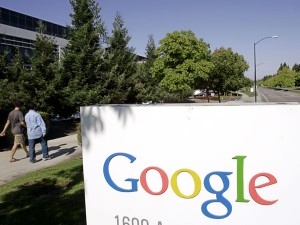Google expands spoken search to desktop computers

Google hopes to extend its dominance in what so far has been Internet's most lucrative market: steering people to the information they want as quickly as possible. AP FILE PHOTO
The features unveiled Tuesday include an option that will allow people to speak their search requests in English while sitting in front of their office and home computers. It’s something they can already do on smartphones running on Google Inc.’s Android software.
The new features serve as another reminder that search remains Google’s backbone even as the company branches into mobile devices, browsers, computer software, music and even television.
By continually coming up with new ways to simplify search requests, Google hopes to extend its dominance in what so far has been Internet’s most lucrative market: steering people to the information they want as quickly as possible. Spurring more search requests provides Google with more opportunities to shows the ads that generate most of its revenue.
For now, the spoken-request option for desktop computers will be offered only on Google’s Chrome browser. It will be activated by clicking on a microphone icon inside Google’s search box. Chrome’s users will get the new feature within the next few days.
Google hopes to eventually make all the features available through Microsoft Corp.’s Internet Explorer and Mozilla’s Firefox browsers, both which have wider audiences than Chrome. Eventually, people will be able to speak requests in other languages, too.
The speech-recognition technology draws upon a database of more than 230 billion words that Google has built while processing spoken requests on phones for the past two and a half years.
Another innovation is designed to load Web pages more quickly after users click on the top search result. The “Instant Pages” option, which also requires Chrome, builds upon a 9-month old feature in which search results automatically appear after typing in a few characters into a search box. The results change as more letters are typed in to complete the search query.
Google is hoping its browser gets another boost Wednesday. That’s when a new line of laptop computers running on an operating system based on Chrome will go on sale. The Chrome laptops from Acer Inc. and Samsung Electronics will cost $349 to $499 and require Internet connections to run most programs because they will have limited storage capacity, not hard drives.
Not all of Google’s latest search options will require Chrome. Among them is a new tool that allows users to drag images into Google’s search results to get a list of results about what’s in the photograph. For instance, a photo from a family vacation years ago could be dragged into the search box to get information about the location.
This image-recognition technology can identify people, but Google so far has decided not to use it for that purpose. Google executives also said the photos entered into the search box won’t be made available to the general public.
Google, which is based in Mountain View, currently processes nearly two out of every three Internet search requests in the U.S. — an advantage that has held firm for several years.
Microsoft and Yahoo Inc. have invested billions of dollars in search during the past eight years with little to show for it. After deciding it would be better off funnelling money into other projects, Yahoo began to rely on Microsoft for most of its search results last year. Microsoft’s Bing search engine has been getting more usage during the past two years, but it hasn’t been able to reverse the huge losses in Microsoft’s online division.
Although Google appears well entrenched as the Internet search leader, it has struggled to counter the threat posed by the success of Facebook. Its popularity poses a problem for Google because most of its content can’t be indexed by Google’s search engine. None of the features introduced Tuesday addressed the Facebook challenge.